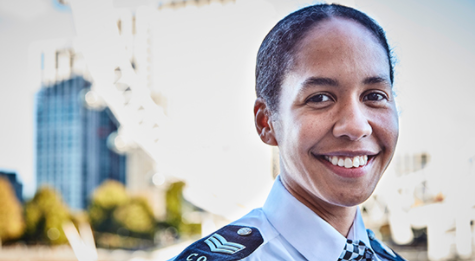
Officer and staff stories - DI Charmain Brenyah
Category: Staff Network Group


After leaving university, Detective Inspector Charmain Brenyah initially took a job on a graduate scheme working for a bank. After five years she decided to leave and follow a passion she had developed during her childhood spent growing up watching crime dramas.
Since switching careers to become a police officer, 14 years ago, she’s enjoyed some varied roles in the Met, from local policing, investigating serious crimes and CID. Charmain has also developed a mentoring scheme for disadvantaged girls and is a family liaison officer, a voluntary role which involves liaising with bereaved families to provide support and assistance throughout the investigation, including at court.
What was your main motivation for joining the police?
One of the things I'm passionate about is helping victims of crime. When people are probably at their worst, we turn up as police officers and they're looking at us to be able to help them, to support them and give them direction, to comfort them. They want somebody they can trust. We need to be that person for them, at what could possibly be the worst times of their lives.
Since joining the Met 14 years ago I have had no regrets, for me it truly is a fantastic place to work. I have been able to work across a variety of busy, challenging and rewarding teams alongside some amazing people. I’ve also been supported by my colleagues, peers and line managers to work in different areas and achieve promotion to Detective Inspector, something I’m hugely proud of.
Whilst it wasn’t my main motivation for joining, I hoped that by becoming a police officer I could be part of the drive to improve diversity in the Met and encourage colleagues to be the best they can be. It’s nice to think that by sharing my experiences I might also help to inspire others to join and start such an exciting and rewarding career.
How did your family feel about you becoming a police officer?
My family were initially unsure about me leaving my original career to start over again, especially as no-one in my family had ever been in the police. I think they had perceptions in regards to the dangerous nature of the job and they did not understand what training I would receive or what opportunities were available to me in the police. However I have worked hard within my Met career, have done a number of different roles and had fantastic opportunities as a result. My family now think my career choice is brilliant – they are proud that I am in the MPS and proud of what I have achieved.
What’s the best thing about your job?
My role as a detective has been amazing, dealing with serious assaults, murders, complex investigations and proactive operations. All of which have been within supportive teams. I love taking an investigation from start to finish, finding the outcome. It can be demanding. For example on the murder team, it can be slightly unpredictable in terms of the hours. So you have to kind of be prepared in that respect. It's not always going to be nine to five. But at the same time, I'm happy to commit to that, and actually, when there are times that you have things that you have to do, family time, you're supported to do them.
As well as leading my own investigations, I manage a team of fantastic detectives who are really committed to their investigations and supporting victims. Something I also really enjoy is working with new Trainee Detective Constables helping them to develop.
How does your job affect your life outside of work?
I’m passionate about making a difference in people’s lives. So in addition to my day job I work with The Girl’s Network to mentor groups of 16 to 19-year olds girls from the least advantaged communities. The Met has helped in this because I’m able to talk to them about the variety of careers they could have here – they could join as detectives, in the mounted section, marine unit, firearms and in police staff roles like HR or finance. We bring the girls into Met buildings, show them what we do, explain to them they can do a range of roles within the Met. And I think the fact that we have a female commissioner is really inspirational, it just shows them what you can achieve.
What’s the best bit of advice you would give to any woman thinking of joining?
Turn up at our recruitment event days, ask questions, find people who are police officers and talk to them and find out a bit more about the different roles, because there are so many different routes in and different roles you can do.


Thank you for registering on VERCIDA - the leading job site for companies that are passionate about diversity and inclusion.
- Check out our client profiles to get the latest on their DE&I credentials
- Look out for client benefits next to all our job specs
- Sign up for job alerts to keep up to date on new roles as they come in
- Search 1000s of roles from the biggest brands
Please proceed to the next step. If you are unable to complete the next stage of application please use the contact form HERE.

 Help us find the best workplace for you by sharing more about yourself.
We will never disclose your information with others.
Help us find the best workplace for you by sharing more about yourself.
We will never disclose your information with others.